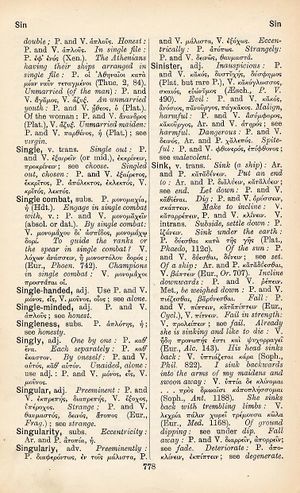sinister
Χεὶρ χεῖρα νίπτει, δάκτυλοι δὲ δακτύλους → Digitum lavat digitus et manum manus → Die Finger waschen Finger, die Hand die andre Hand
English > Greek (Woodhouse)
adj.
Inauspicious: P. and V. κακός, δυστυχής, δύσφημος (Plat. but rare P.), V. κακόγλωσσος, σκαιός, εὐώνυμος (Aesch., P. V. 490).
Evil: P. and V. κακός, ἀνόσιος, πανοῦργος, πάγκακος.
Malign, harmful: P. and V. ἀσύμφορος, κακοῦργος, Ar. and V. ἀτηρός; see harmful.
Dangerous: P. and V. δεινός, Ar. and P. χαλεπός.
Spiteful: P. and V. φθονερός, ἐπίφθονος; see malevolent.
Latin > English (Lewis & Short)
sĭnister: tra, trum (
I comp. sinisterior; sup. sinistimus, Prisc. pp. 605 and 607 P.; Fest. s. v. dextimum, p. 74; and s. v. sinistrae, p. 339 Müll.), adj. etym. dub.; perh. from sinus (i. e. togae); cf. Pott, Etym. Forsch. 2, 555; the ending is a double comp. -is and -ter; cf.: magister, minister.
I Left, on the left, on the left hand or side (syn.: laevus, scaevus): manus sinistra (opp. dextra), Quint. 11, 3, 114: manus, Nep. Dat. 3; Quint. 11, 3, 159: bracchium, id. 11, 3, 141: latus, id. 11, 3, 99: numerus, id. 11, 3, 93; 11, 3, 113; 11, 3, 140: pes, id. 11, 3, 125; 11, 3, 159: cornu (opp. dextrum), Ter. Eun. 4, 7, 5; Caes. B. G. 7, 62; id. B. C. 2, 34; 3, 67 al.: pars, id. B. G. 2, 23; id. B. C. 2, 4 fin.: angulus castrorum, id. ib. 3, 66: ripa, Hor. C. 1, 2, 18: calceus, Suet. Aug. 92: tibia, Phaedr. 5, 7, 7 et saep.—As substt.
1 sĭnistrum, i, n. (sc. latus), the left side: reicere a sinistro togam, Quint. 11, 3, 144; so, in sinistrum, id. 11, 3, 109; 11, 3, 113; 11, 3, 114; 11, 3, 135.—
2 sĭnistra, ae, f. (sc. manus), the left hand, the left: sinistrā impeditā satis commode pugnare non poterant, Caes. B. G. 1, 25; id. B. C. 1, 75 fin.; Quint. 11, 3, 131; 11, 3, 160; Suet. Claud. 21; Ov. M. 12, 89 et saep.—Used in stealing: natae ad furta sinistrae, Ov. M. 13, 111; cf. Cat. 12, 1; hence, of a thief's accomplices: Porci et Socration, duae sinistrae Pisonis, id. 47, 1.—As bearing the shield and defending: idem (Afer) per allegoriam M. Caelium melius obicientem crimina quam defendentem, Bonam dextram, malam sinistram habere dicebat, Quint. 6, 3, 69—
B Transf., the left side: cur a dextrā corvus, a sinistrā cornix faciat ratum? Cic. Div. 1, 39, 85: aspicite a sinistrā, id. Phil. 6, 5, 12: aspice nunc ad sinistram, Plaut. Merc. 5, 2, 38: sub sinistrā Britanniam relictam conspexit, Caes. B. G. 5, 8: miles dexterā ac sinistrā muro tectus, id. B. C. 2, 15; cf.: innumerabiles supra infra, dextrā sinistrā, ante post ejusmodi mundos esse, Cic. Ac. 2, 40, 125.— Rarely in <number opt="n">plur.</number>: sinistris repentino consilio Poetelii consulis additae vires (opp. dextra pars), Liv. 9, 27, 9.—Comp.: in sinisteriore parte (= sinistrā), Varr. L. L. 9, § 34 Müll.; so, cornu (opp. dexterius), Galb. ap. Cic. Fam. 10, 30, 4: bracchium, Suet. Dom. 17: mamma, Cels. 4, 1 med.: equus funalis, Suet. Tib. 6 fin.: rota, Ov. M. 2, 139.—Sup.,
v. supra init.—
II Trop.
A Awkward, wrong, perverse, improper (poet. and in post-Aug. prose): mores, Verg. A. 11, 347: liberalitas, Cat. 29, 16: instituta (Judaeorum), Tac. H. 5, 5: natura (with prava), Curt. 7, 4, 10.—
B Unlucky, injurious, adverse, unfavorable, ill, bad, etc. (poet. and in post-Aug. prose): arboribus satisque Notus pecorique sinister, Verg. G. 1, 444: interpretatio, Tac. Agr. 5 fin.; cf.: sermones de Tiberio, id. A. 1, 74; so, sermones, Plin. Ep. 1, 9, 5: fama eo de homine, Tac. A. 6, 32; 11, 19; id. H. 1, 51 fin.: rumor lenti itineris, id. ib. 2, 93 fin.: diligentia, Plin. Ep. 7, 28, 3 et saep.: pugna Cannensis, Prop. 3, 3 (4, 2), 9: studii signa sinistra mei, Ov. Tr. 5, 7, 64; v. also infra, C. fin.—With gen.: (Hannibal) fidei sinister, faithless, Sil. 1, 56 (cf.: pravos fidei, id. 3, 253).—Subst.: sĭnistrum, i, n., evil: (matrona) studiosa sinistri, Ov. Tr. 2, 257.—
C With respect to auspices and divination, acc. to the Roman notions, lucky, favorable, auspicious (because the Romans on these occasions turned the face towards the south, and so had the eastern or fortunate side on the left; while the Greeks, turning to the north, had it on their right; cf. dexter, II. 2.): ita nobis sinistra videntur, Graiis et barbaris dextra, meliora. Quamquam haud ignoro, quae bona sint, sinistra nos dicere, etiam si dextra sint, etc., Cic. Div. 2, 39, 82; cf.: fulmen sinistrum auspicium optimum habemus ad omnes res praeterquam ad comitia, id. ib. 2, 35, 74 (with this cf. id. Phil. 2, 38, 99): liquido exeo foras Auspicio, avi sinistra, Plaut. Ep. 2, 2, 2; so, avi sinistra, id. Ps. 2, 4, 72; cf. cornix, Verg. E. 9, 15: volatus avium, Plin. Pan. 5, 3: tonitrus, Ov. Tr. 1, 9, 49.—Sometimes in the Greek sense (or in direct reference to the signif. B.), unlucky, unfavorable, inauspicious: di, precor, a nobis omen removete sinistrum, Ov. H. 13, 49: avibus sinistris, id. ib. 2, 115: sinistris auspiciis, Val. Max. 4, 7, 2 fin.: fulmen, Cic. Phil. 2, 38, 99: sinistram approbationem (opp. dextram), Cat. 45, 8 and 17; cf: sinistro pede proficisci, App. M. 1, p. 104, 23.—Hence, adv.: sĭnistrē, badly, wrongly, perversely: derisum semel exceptumque sinistre, Hor. A. P. 452: accipere, Tac. H. 1, 7; 3, 52 fin.: non tam sinistre constitutum est, Plin. Pan. 45, 5.

